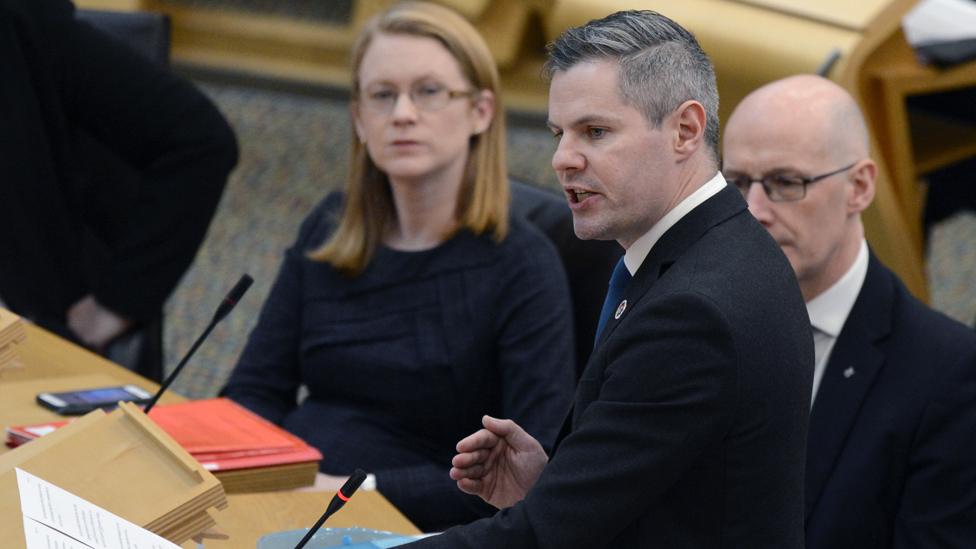Could the SNP do a budget deal with the Tories?
- Published
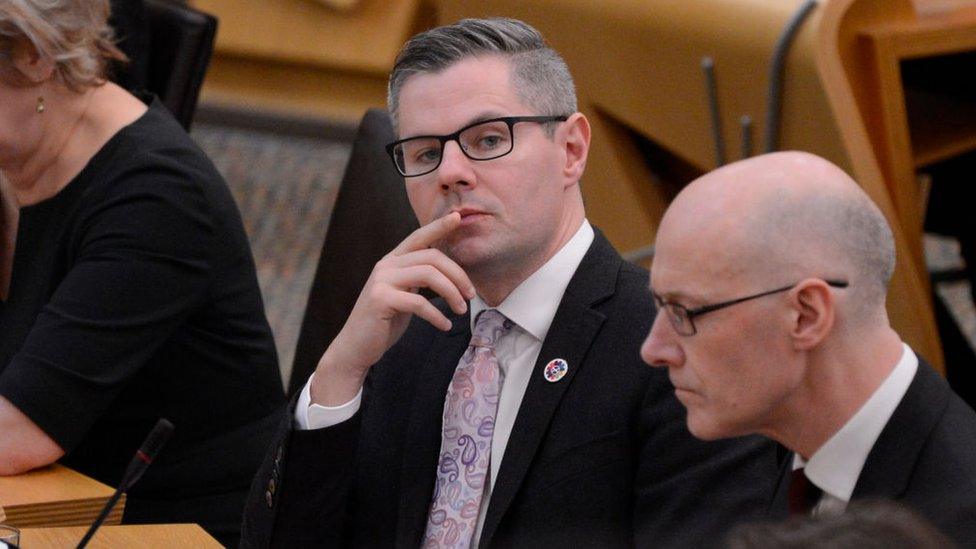
Might Derek Mackay look to the Tories for a budget deal this year?
Budget Day looms. Or, rather, days. We have the Scottish version on 6 February and then the UK Budget on 11 March.
Astute observers will have spotted the obvious flaw. Scottish spending plans are designed to fit within the wider UK parameters to some extent - and are partly dependent on stats supplied by the Treasury.
This won't happen properly this year because the UK statement has been delayed as a consequence of Brexit, the election in December and choice by, one presumes, the Chancellor.
Nevertheless, Derek Mackay, Scotland's finance secretary, is ebullient. As ever. He cannot wait any longer, not least because Scotland's local authorities need detail, now.
Mr Mackay insists he will provide a full budget in a fortnight's time. Not interim. Not a draft. The real thing, despite the externally-caused difficulties.
In turn, Treasury sources insist that they are co-operating fully with the Scottish government in order to obviate the calendrical problems.
For example, they note that Mr Mackay is already aware of £1.2bn worth of Barnett consequentials from the UK autumn statement in September.
They note further that the estimates of block grant adjustments (BGAs) were shared with the Scottish government in December and have been the subject of discussion. These BGA figures are vital in determining the final extent of Treasury funding to Scotland.
But still Mr Mackay will be operating in the dark to some extent. Tory spokespersons tend to discount this. Murdo Fraser said the minister was guilty of "faux outrage". Courageous use of French, there, Murdo, in these Brexit times.
However, the minister hopes that this uncertainty may - I stress, may - concentrate minds in order to facilitate a relatively speedy progress for his Budget Bill at Holyrood.
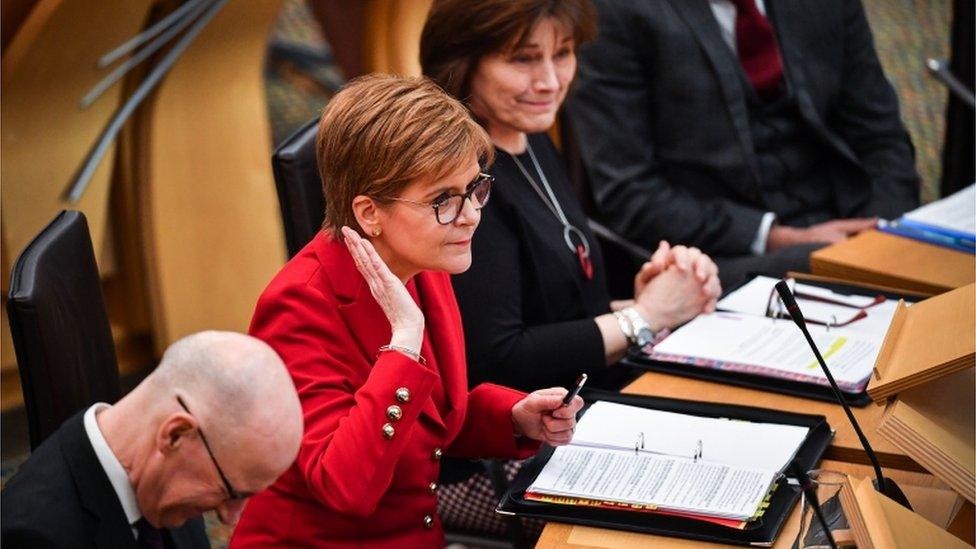
Nicola Sturgeon had an open ear for some leaders - but took a more partisan approach to others
Budgetary matters were on the minds of MSPs today. Nicola Sturgeon was questioned by the Tories about police funding - and by Labour about student support.
Willie Rennie of the Liberal Democrats pursued a path he has made his own by urging an investigation into mental health problems besetting police officers.
Understandably, given the gravity of the topic, Nicola Sturgeon offered a decidedly consensual response. She fully accepted the seriousness of the issue - and suggested that parliament might, collectively, seek answers.
By contrast, the exchanges with Jackson Carlaw of the Conservatives and Richard Leonard of Labour were more partisan in nature. Broadly, they concerned spending and thus the forthcoming budget.
Ideological distinction
In recent years, the SNP have relied upon the Greens to get their budget through. However, they are becoming discernibly weary with that arrangement.
The feeling is that the Greens ask rather too much, despite having only six MSPs. That inchoate sense sharpened somewhat when Scottish government ministers were constrained, against their political instincts, to back the power for local workplace parking levies.
Those with longer memories will recall that the SNP used to cut a deal with the Tories over the budget. The Tories used the arrangement to claim that they had made the difference on issues like town centre regeneration.
In came Ruth Davidson as Tory leader - and the deals stopped (they weren't needed, of course, while the SNP had a majority). Ms Davidson favoured a sharp, ideological distinction between the Tories and the SNP.
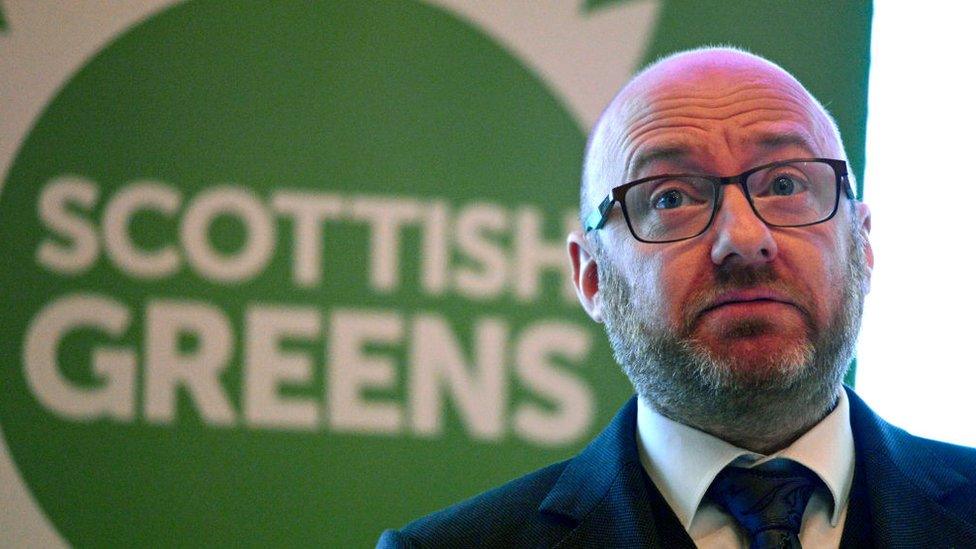
The six Scottish Green MSPs have managed to exert influence on the government by doing budget deals
Could that change? Decidedly tricky, given Brexit, the arguments over independence and the Holyrood elections next year.
But not impossible. At the very least, Scottish government ministers would welcome an alternative to dealing with the Greens.
Labour? Not on the cards. Today Nicola Sturgeon lampooned Mr Leonard for asking her to prioritise student support. Only yesterday, she said, Labour had wanted top ranking given to local government.
The Liberal Democrats? No. They are "doing a Davidson". They have said repeatedly that they cannot really deal with the SNP while an independence referendum remains on the table.
One SNP source told me that the LibDems had "talked themselves into a corner - and into irrelevance". I asked another about the budgetary salience of the Liberal Democrats. The answer was: "Who?"
Substantial price
Might that change? Don't think so. Which leaves the Tories. They have declared openly that they are willing to talk and would, indeed, be keen to prise the SNP away from Holyrood's verdant tendency.
But the price, as you can imagine, is substantial. Tax cuts to reverse the additional revenues recouped from those in Scotland earning more than £27k. Or, at the very least, no new impositions.
And more dosh for local government, higher education, the NHS - and the police. Mr Carlaw opened today by advancing the case for spending on the cops.
The Tory leader quoted from officers who painted a grim picture of crumbling infrastructure, literally. The ceiling at Broughty Ferry police station caved in. Not long after the justice secretary played down the complaints as "hyperbole".
Mr Carlaw said further that extra funding for the police in England would result in consequential cash for Scotland of £100m.
Ms Sturgeon's response was robust. Firstly, she said that years of Tory austerity had cut Scotland's overall budget by £1.5bn in real terms over a decade.
Secondly, she said that Tory tax plans in Scotland would remove £270m from ministerial hands, reducing the capacity to spend.
Thirdly, she said that spending on the police estate had increased (just not, unaccountably, in the Ferry. What have the denizens of Dundee's poshest suburb done to merit such neglect?).
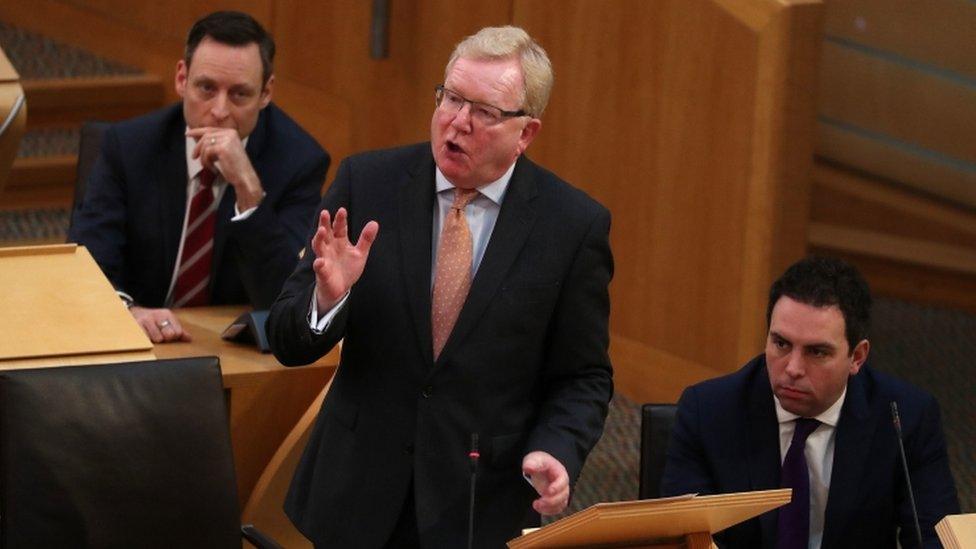
Jackson Carlaw asked Nicola Sturgeon for more funding for the police
Mr Carlaw smiled benignly. Yes, the retaliation had been robust and forthright. But it was not a flat-out rejection of possible talks.
Where might those go? Self-evidently, a year out from an election, Derek Mackay and Nicola Sturgeon will want a populist budget.
That means more money, if possible, for pressure points. Including the police. And the NHS. And, and, and…the customary dilemma.
On tax, I expect Mr Mackay to stick to the existing rates - 19, 20, 21, 41, 46. He signalled he wanted that structure to persist when he first outlined it.
However, it would be open to him to change the bands. To alter the salary points at which an individual enters each of those rates.
Again, though, I wouldn't necessarily expect radical change. He is unlikely, however, to want to depart from what he believes is a progressive approach, benefiting low earners, despite the imprecations of the Conservatives.
Today, Ms Sturgeon said that the Tory tax plans would give most assistance to high earners, albeit they were put forward as helping the middle classes.
More bargaining to come. And perhaps, just perhaps, not only with the Greens.
- Published13 January 2020
